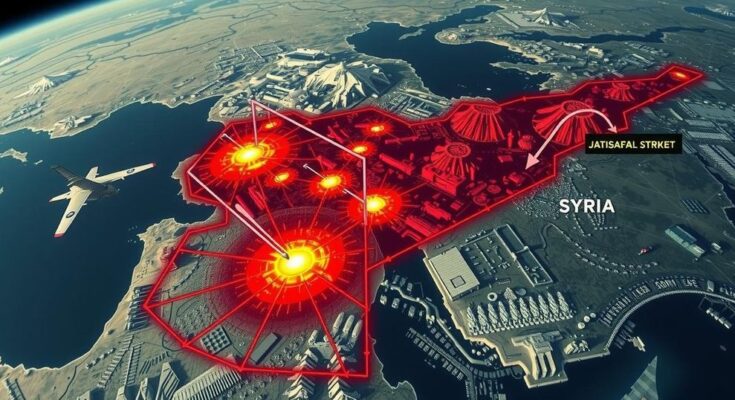Israeli airstrikes in northwestern Syria have caused explosions registering a magnitude of 3.0 on seismic sensors, reflecting unprecedented military intensity. Targeting munitions depots in Tartus, these actions raise regional stability concerns as international condemnation grows over violations of sovereignty. The implications for military strategy and humanitarian conditions in Syria suggest long-lasting consequences across the Middle East.
In a significant escalation of military engagement, recent Israeli airstrikes conducted in northwestern Syria have registered as a 3.0 magnitude earthquake on seismic measurement devices, highlighting the unprecedented intensity of these operations. The Israeli Defense Forces (IDF) specifically targeted munitions depots and vital military infrastructure in the vicinity of Tartus, producing explosions massive enough to create a substantial mushroom cloud visible from afar. This marked the most intense bombardment in the area in over a decade, suggesting a critical shift in Israel’s approach to military operations.
Military analysts indicate that the essential goal behind these strikes is to dismantle weapon stockpiles posing a potential threat of falling into the hands of extremist factions amidst the ongoing turbulence in Syria. With the recent political upheaval resulting in the ousting of President Bashar al-Assad, concerns have intensified regarding the spread of advanced weaponry among non-state adversaries.
The airstrikes have triggered varied reactions on the international front, with countries such as Iran and Qatar condemning the actions as blatant violations of Syrian sovereignty. They accuse Israel of taking advantage of Syria’s internal discord for strategic advantages. In contrast, Israeli representatives argue that the military operations are indispensable for protecting the nation’s security and preventing hostile forces from re-emerging along its borders.
The ramifications of such aggressive military action could potentially alter the dynamics of regional stability. The overwhelming force deployed in these airstrikes may pave the way for future military interventions and lower the threshold for engagement in the region. Furthermore, the resultant seismic effects have raised pertinent environmental and safety issues, complicating humanitarian efforts in war-ravaged Syria.
Emerging reports reveal that the facilities targeted during these airstrikes were integral components of Syria’s military logistics network, housing sophisticated missile systems and munitions. Israel’s commitment to executing such extensive operations underscores its resolve to maintain its superior military capabilities within the region.
As these developments unfold, the ongoing consequences of Israel’s decisive and seismic airstrikes on Syria’s military effectiveness and the broader geopolitical implications remain to be fully assessed. What is abundantly clear is that the repercussions of this unprecedented military operation will resonate throughout the Middle East for an extended period.
The recent Israeli airstrikes in Syria have raised significant concerns within the international community regarding military strategy and regional stability. As Syria continues to grapple with internal conflict and the subsequent power vacuums created by regime changes, foreign military actions are increasingly common. The IDF’s focus on eliminating potential threats associated with extremist groups underlines a strategic objective to thwart the spread of advanced weaponry. These developments not only escalate military tensions but also complicate the humanitarian landscape within Syria, raising alarm over safety and environmental implications while reflecting broader geopolitical power struggles.
In summary, the recent Israeli airstrikes in northwestern Syria have not only resulted in substantial military impacts but have also triggered significant seismic events perceptible on earthquake measurement devices. The strikes, aimed at crippling weapons depots, signal a potential shift in military engagement strategies in the region, eliciting strong reactions from opposing nations. Furthermore, the implications for regional stability and humanitarian conditions in Syria are critical, suggesting that the effects of these military operations will persist long into the future.
Original Source: themusicessentials.com




